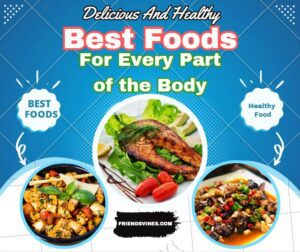Best Foods for Every Part of the Body
Discover the best foods for every part of your body to promote overall health and well-being. From brain-boosting snacks to heart-friendly meals, this comprehensive guide covers it all.

Best Foods
When it comes to our bodies, what we eat matters. The food we consume can have a profound impact on our overall health and wellness. From providing essential nutrients to supporting specific body functions, choosing the right foods can make a significant difference in how we feel and function. In this comprehensive guide, we’ll explore the best foods for every part of the body, backed by scientific research and real-world experiences. Whether you’re looking to boost brainpower, strengthen your heart, or nourish your skin, we’ve got you covered.
Best Foods for the Brain
The brain is the command center of our bodies, and nourishing it properly is crucial for optimal cognitive function and mental well-being. Here are some LSI keyword-rich foods that can support brain health:
1. Fatty Fish: Omega-3 Powerhouse
Fatty fish, such as salmon, mackerel, and sardines, are rich in omega-3 fatty acids, specifically DHA and EPA. These essential fats play a vital role in brain development and function, improving memory, and reducing the risk of cognitive decline.
2. Blueberries: Brain-Boosting Berries
Blueberries are packed with antioxidants, including flavonoids called anthocyanins, known to enhance brain function. Regular consumption of blueberries can help improve memory and cognitive performance.
3. Broccoli: Brain-Boosting Veggies
Broccoli is a great source of choline, a nutrient that supports brain health by aiding in the production of neurotransmitters that regulate mood and memory.
4. Nuts and Seeds: Power-Packed Snacks
Nuts and seeds, such as walnuts, almonds, and flaxseeds, are rich in antioxidants, vitamin E, and healthy fats. These nutrients contribute to improved cognitive function and may protect the brain from oxidative stress.
5. Dark Chocolate: Indulgence with Benefits
Dark chocolate contains flavonoids that boost blood flow to the brain, enhancing cognitive abilities and mood. In moderation, dark chocolate can be a delicious brain-boosting treat.
Best Foods for the Heart
A healthy heart is essential for overall well-being. These heart-friendly foods can keep your ticker in top shape:
6. Oats: Soluble Fiber for Heart Health
Oats are a great source of soluble fiber, which helps lower LDL cholesterol levels and supports heart health. Start your day with a hearty bowl of oatmeal for a heart-healthy breakfast.
7. Avocado: Healthy Fats for the Heart
Avocados are rich in monounsaturated fats, which can help reduce bad cholesterol levels and lower the risk of heart disease.
8. Olive Oil: Mediterranean Elixir
Olive oil, a staple of the Mediterranean diet, is loaded with antioxidants and healthy fats that promote heart health and reduce inflammation.
9. Berries: Antioxidant Powerhouses
Berries, such as strawberries and raspberries, are packed with antioxidants that protect the heart from damage caused by free radicals.
10. Spinach: Nutrient-Rich Greens
Spinach is a potent source of vitamins and minerals like potassium, which helps maintain healthy blood pressure levels.
Best Foods for the Digestive System
A well-functioning digestive system is essential for nutrient absorption and overall health. These foods can keep your gut happy:
11. Yogurt: Probiotic Delight
Yogurt contains live probiotics that promote a healthy balance of gut bacteria, supporting digestion and boosting the immune system.
12. Ginger: Soothing and Anti-Inflammatory
Ginger has natural anti-inflammatory properties that can help alleviate digestive discomfort and improve overall gut health.
13. Whole Grains: Fiber-Rich Goodness
Whole grains, such as quinoa and brown rice, are rich in fiber, which aids digestion and prevents constipation.
14. Fermented Foods: Gut-Friendly Treats
Fermented foods like kimchi and sauerkraut are packed with probiotics, promoting a diverse gut microbiome and supporting digestion.
15. Papaya: Enzyme-Rich Superfruit
Papaya contains enzymes like papain, which aid in the breakdown of proteins and support healthy digestion.
Best Foods for Healthy Skin
Healthy, glowing skin starts from within. These foods can help you achieve that radiant complexion:
16. Sweet Potatoes: Skin-Loving Beta Carotene
Sweet potatoes are rich in beta carotene, which the body converts into vitamin A, promoting healthy skin and a natural glow.
17. Fatty Fish: Omega-3 for Skin
Omega-3 fatty acids from fatty fish help maintain skin moisture, reducing dryness and inflammation.
18. Nuts: Nutrient-Rich Skin Saviors
Nuts, such as almonds and walnuts, provide vitamin E, which protects the skin from oxidative damage and premature aging.
19. Green Tea: Skin-Protecting Elixir
Green tea is rich in antioxidants, catechins, and polyphenols that can help protect the skin from sun damage and improve overall complexion.
20. Tomatoes: Lycopene-Rich Skin Booster
Tomatoes are a source of lycopene, an antioxidant that promotes skin health and protects against UV damage.
When it comes to maintaining a healthy body, what we eat is just as important as what we avoid. Certain foods and habits can hurt our well-being and should be limited or eliminated from our diets. Let’s explore what to avoid for a healthy body:
What to Avoid for a Healthy Body
1. Processed Foods
Processed foods are often loaded with unhealthy additives, preservatives, and high levels of sodium and sugar. They offer little nutritional value and can contribute to weight gain, inflammation, and an increased risk of chronic diseases.
2. Sugary Beverages
Sugary beverages, such as sodas, energy drinks, and fruit juices with added sugars, can lead to weight gain and spike blood sugar levels. They provide empty calories and contribute to the risk of obesity and type 2 diabetes.
3. Trans Fats
Trans fats, commonly found in processed snacks, baked goods, and fried foods, raise LDL cholesterol levels (bad cholesterol) and increase the risk of heart disease.
4. Excessive Alcohol
While moderate alcohol consumption may have some health benefits, excessive drinking can lead to liver damage, addiction, and an increased risk of various health issues.
5. High-Sodium Foods
Consuming too much sodium can lead to high blood pressure, which is a significant risk factor for heart disease and stroke. Processed foods and salty snacks are often high in sodium.
6. Artificial Sweeteners
Artificial sweeteners, commonly found in diet sodas and low-calorie foods, may disrupt gut health and metabolism, leading to potential adverse effects on overall health.
7. Refined Carbohydrates
Refined carbohydrates, like white bread, white rice, and pastries, have a high glycemic index, causing rapid spikes in blood sugar levels and potentially leading to insulin resistance and weight gain.
8. High-Fat and Fried Foods
Foods high in unhealthy saturated and trans fats, such as fast food and deep-fried items, can contribute to obesity and increase the risk of heart disease.
9. Processed Meats
Processed meats, including bacon, sausages, and deli meats, contain harmful preservatives and high levels of sodium and have been linked to an increased risk of cancer and heart disease.
10. Artificial Additives and Preservatives
Artificial additives and preservatives found in many processed foods can have adverse effects on health and may cause allergic reactions in some individuals.
11. Sugary Snacks and Desserts
Regular consumption of sugary snacks and desserts can lead to weight gain, tooth decay, and an increased risk of chronic conditions like type 2 diabetes.
12. High-Caffeine Beverages
Excessive caffeine consumption can lead to sleep disturbances, anxiety, and digestive issues. Energy drinks, in particular, should be consumed with caution due to their high caffeine content.
13. High-Calorie, Low-Nutrient Foods
Foods that are high in calories but low in essential nutrients, such as certain fast foods and sugary treats, provide little nourishment and can lead to weight gain and nutrient deficiencies.
14. Artificial Trans Fat
Artificial trans fat, often found in margarine and some processed foods, should be avoided as it can raise LDL cholesterol levels and increase the risk of heart disease.
15. High-Fructose Corn Syrup
High-fructose corn syrup, a common sweetener in processed foods, has been linked to obesity, insulin resistance, and liver problems when consumed in large amounts.
By being mindful of our food choices and avoiding these harmful items, we can support our bodies health and well-being. Opting for whole, nutrient-dense foods and adopting a balanced diet can lead to improved energy levels, better digestion, and a reduced risk of chronic diseases.
Remember, small changes in our eating habits can make a significant difference in our overall health and longevity. Prioritizing real, whole foods and staying hydrated with water are simple yet powerful steps towards a healthier body and a better quality of life.
Others
The saying “You are what you eat” couldn’t be truer. The foods we consume play a vital role in supporting every part of our body, from the brain to the heart, and even the skin. By incorporating brain-boosting fish, heart-healthy avocados, gut-friendly yogurt, and skin-loving sweet potatoes into our diets, we can nourish our bodies and promote overall well-being.
Remember, a balanced diet that includes a variety of nutrient-rich foods is the foundation for a healthy life. So, let’s make conscious choices and embrace the power of food to fuel our bodies and minds.
FAQs about the Best Foods for Every Part of the Body
Q: Can the foods I eat impact my brain’s Health?
A: Yes, research suggests that a balanced diet rich in brain-boosting foods can enhance cognitive function and protect against cognitive decline.
Q: Are avocados high in calories and fats, making them unsuitable for heart health?
A: While avocados are higher in calories, they contain heart-healthy monounsaturated fats that can improve heart health when consumed as part of a balanced diet.
Q: Is yogurt the only source of probiotics for gut health?
A: While yogurt is a popular source of probiotics, other fermented foods like kefir, kombucha, and miso also provide beneficial gut bacteria.
Q: Can I rely solely on skincare products for healthy skin?
A: Skincare products can complement a healthy diet, but the foundation of glowing skin lies in nourishing it from within with nutrient-rich foods.
Q: Are there any side effects of consuming too many antioxidant-rich foods?
A: While antioxidants are generally safe, excessive consumption of certain supplements may cause adverse effects.
Q: Can I achieve a balanced diet by focusing only on specific “superfoods”?
A: While superfoods offer various health benefits, a well-rounded diet with a variety of nutrient-rich foods is key to achieving overall health and wellness.

[…] essential nutrients and promoting overall well-being, there’s nothing quite like the power of sunfood superfoods. These nutrient-dense foods are packed with vitamins, minerals, antioxidants, and other […]